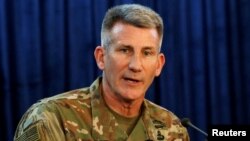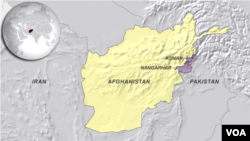A provincial leader of the Islamic State militant group in Afghanistan has been killed in a U.S. air strike in eastern Kunar province, Afghan and U.S. military officials confirmed Sunday.
“U.S. and Afghan Forces have confirmed the death of Kunar provincial Islamic State of Iraq and Syria-Khorasan (ISIS-K) emir, Abdul Rahman,” U.S. forces in Afghanistan said in a statement.
Rahman was killed along with three additional senior IS members on Thursday in Kunar’s Dara-e-Pech district, the statement added.
Abdul Rahman was a potential candidate to become the IS leader in Afghanistan following Abu Sayed’s death in a U.S airstrike last month.
“The death of Abdul Rahman deals yet another blow to the senior leadership of ISIS-K,” said General John Nicholson, Commander of U.S. forces in Afghanistan. “He found out just like those before him that there are no safe havens in Afghanistan.”
U.S. and Afghan forces have been engaged in joint- counterterrorism operations against IS in eastern Afghanistan. American and Afghan military forces have promised to eliminate IS in Afghanistan in 2017.
Hundreds of IS fighters, including several senior commanders, have been killed in recent months.
Abu Sayed, the group’s top leader in Afghanistan, was killed in a U.S. airstrike last month. Sayed was the second IS leader in the past four months, and third in the past year, to have been targeted and killed. Abdul Hasib, his predecessor, was targeted in a U.S.-Afghan security forces raid in Nangarhar's Achin district in April.
“We will hunt them down until they are no longer a threat to the Afghan people and the region,” the commander of U.S. forces in Afghanistan said following the death of Abdul Rahman.
Based in southern parts of eastern Nangarhar province, IS's Khorasan Province branch (ISIS-K) emerged in early 2015 in the mountainous areas of Afghanistan and Pakistan to cover Afghanistan, Pakistan and “other nearby territories.”
IS in Afghanistan has primarily been active in several districts of eastern Nangarhar province. Since its emergence, the terror group has targeted villages in several districts in the province, killing and abducting hundreds of people and setting their homes on fire.
IS under increasing pressure
Facing large-scale joint-U.S. and Afghan forces operations in Nangarhar, IS militants are trying to expand to mountainous parts of the adjacent Kunar and Nuristan provinces which share a border with Pakistan.
Juma Gul Hemmat, Kunar’s police chief, told VOA that the terror group has a presence in at least eight districts in Kunar. “The group runs a training base in the Patash valley, where foreign fighters, including Arabs and Pakistanis train new fighters," Juma Gul Hemmat said.
Police authorities in Nangarhar last week arrested five minors - 10 to 15 years old, who were being transported by IS recruiters from Kunar to a Nangarhar’s remote district for training purposes.
Despite the battlefield successes of Afghan and American Special Forces against the Islamic State in Afghanistan, IS has carried out or claimed responsibility for several deadly attacks across the country, sparking fears that the group might be seeking to trigger sectarian conflict in Afghanistan and the greater central Asian region.
IS said its fighters stormed Iraq’s embassy in Kabul last month, and the terror group also claimed responsibility for a suicide attack on a Shi'ite mosque in western Herat province in early August.
Amongst the dead was the father of Fatima Qaderyan, captain of the Afghan all-girls robotics team that made headlines last month after managing to get U.S visas to participate in the International Robot Olympics for High School Students in Washington D.C.
They were initially denied U.S visas, but following President Trump’s personal intervention, they were able to travel to the U.S.
Some information in this report came from Reuters.






